Zlatan Ibrahimovic: ‘Mourinho is cool – the older coaches get, the cooler they get’
The Swedish superstar is about to lead out his country at Euro 2016 and,
probably, reunite with his old Inter coach at Manchester United. But
first he has another order of business – showing football how to do
fashion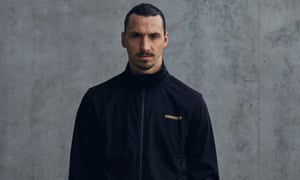
‘Hello. I am Zlatan,” announces Zlatan Ibrahimovic, Sweden’s greatest footballer – and author of the bestselling memoir I Am Zlatan. Then he sits down and finishes the wrap he is eating.
We’re upstairs in the Théâtre Trévise in Paris in early May. Ibrahimovic has called the city home since signing for Paris Saint-Germain from AC Milan in 2012. The next day, he will announce, in typically bombastic style, that he is leaving the club (“I came like a king, left like a legend”). Huge news, really – but today he’s here to talk about a new line of sportswear he has designed, light relief from the summer’s non-stop transfer chatter.
Ibrahimovic’s career has taken him to many of the world’s most famous football clubs – including Ajax, Juventus, Internazionale, Barcelona, AC Milan and PSG – at one point making him the sport’s most expensive player in total transfer fees (he has since been pipped to that accolade by former teammate Ángel Di María). Soon, if the reports are correct, he will add Manchester United to the list.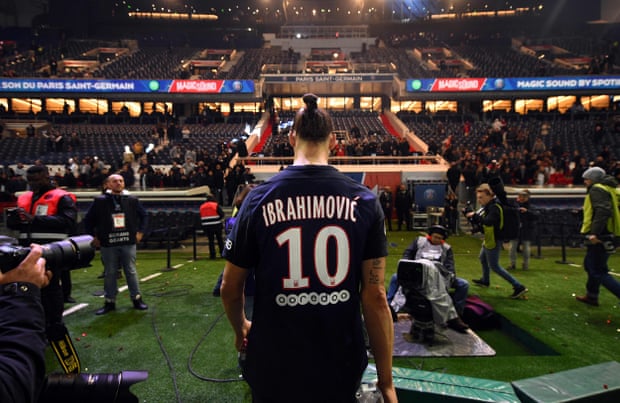 Having spent so much time in two of Europe’s style capitals, perhaps
it’s unsurprising that he’s moving into fashion. His range, called A-Z,
is tasteful and – importantly – cheapish (about €39, or £31, for a top).
If you’re thinking monochrome tracksuits with “ZLATAN” printed down the
leg, think again. The collection comprises low-key, hyper-normal
sportswear – an edifying concept, given the way fashion has doggedly
co-opted sportswear in the past few years. The idea, he explains, is for
it to be affordable in a way that sportswear wasn’t when Ibrahimovic
was a second-generation immigrant teenager playing football in the 90s
in Rosengård, a tough, multi-ethnic district of Malmö. “The clothes are
basic,” he says with a smile. “They are for everyone of every
background. You know, like mine. I will never forget where I came from,
and I don’t forget the people I’ve met on
Having spent so much time in two of Europe’s style capitals, perhaps
it’s unsurprising that he’s moving into fashion. His range, called A-Z,
is tasteful and – importantly – cheapish (about €39, or £31, for a top).
If you’re thinking monochrome tracksuits with “ZLATAN” printed down the
leg, think again. The collection comprises low-key, hyper-normal
sportswear – an edifying concept, given the way fashion has doggedly
co-opted sportswear in the past few years. The idea, he explains, is for
it to be affordable in a way that sportswear wasn’t when Ibrahimovic
was a second-generation immigrant teenager playing football in the 90s
in Rosengård, a tough, multi-ethnic district of Malmö. “The clothes are
basic,” he says with a smile. “They are for everyone of every
background. You know, like mine. I will never forget where I came from,
and I don’t forget the people I’ve met on 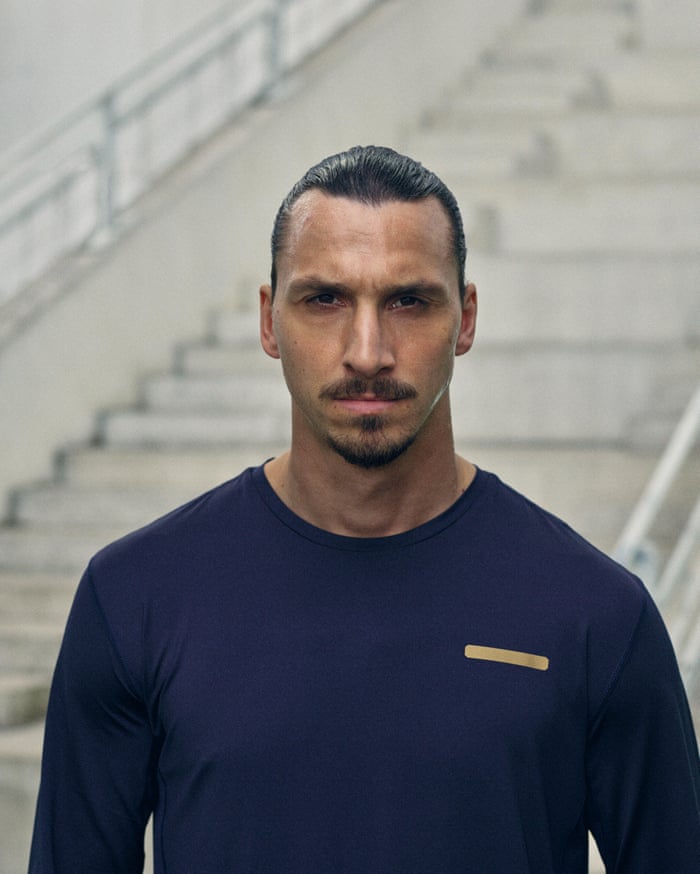 Ibrahimovic grew up in Rosengård with his Bosnian Muslim father and
Croatian Catholic mother. “The first time I went into the city, I was
17. I didn’t know outside the area. I always wore hand-me-downs. It was
cool, though; for me, it [Rosengård] was paradise, because it was all I
knew.” As a teenager, he started playing for Malmö, before heading off –
in 2001, at the age of 19 – on his grand tour of Europe. “When you go
back [to Rosengård, now subsumed into a new district],” he says, “you
still see people in training clothes. There are no suits.”
Ibrahimovic grew up in Rosengård with his Bosnian Muslim father and
Croatian Catholic mother. “The first time I went into the city, I was
17. I didn’t know outside the area. I always wore hand-me-downs. It was
cool, though; for me, it [Rosengård] was paradise, because it was all I
knew.” As a teenager, he started playing for Malmö, before heading off –
in 2001, at the age of 19 – on his grand tour of Europe. “When you go
back [to Rosengård, now subsumed into a new district],” he says, “you
still see people in training clothes. There are no suits.”
Now 34, Ibrahimovic’s rags-to-riches story makes this a fairly risk-free venture: first, people will buy the range because it’s by Zlatan; second, as he says: “Even if I stop playing now, I will have food to eat – and I will have food to eat for ever. I don’t do this for the economy.”
Still, footballers and fashion ... it’s a problematic marriage. Consider Cristiano Ronaldo and his catastrophic CR7 line. “When we talk about fashion, the only one is Beckham,” he says. “The rest? You leave them. These people, they see the doll in the window and they buy the exact clothes of the doll and walk out the shop and they think: I am fashion.” He leans forward. “I don’t follow fashion. If I like it, I buy it. I don’t think about what shirt goes with [what] pants. To me, you are football or you are fashion. Either you do it 100% or 200%. Not 10%. You don’t need to pretend to be perfect.”
This is typical Ibrahimovic. He describes his career in quotable hyperbole, phrases affectionately known as Zlatanisms – “a World Cup without me isn’t worth watching”, things like that. And with cause, you could say. The Guardian’s Barney Ronay described him as “a player capable of moments of skill and physical dexterity beyond the reach of pretty much anyone else on the planet”. He’s a genius and a maniac; random, acrobatic and spectacular. Nothing followed by nothing ... then the impossible: dribbling around six defenders to score (at Ajax) or the famous bicycle kick against England three years ago. When he plays, he’s a vision and a villain. In person, however, he’s open and smiling. When talking about “fashion”, he’s even a little nervous. “I am absolutely not perfect, I will still do mistakes.” I haven’t seen you make mistakes, I say. “Listen. Tiger Woods pretended to be perfect. And what happened? We learn from mistakes. I am realistic – and I have always said this.” He pauses. “But only I decide if it is a mistake.” He bursts out laughing. And he’s back.
The Zlatanisms are there (he talks about himself in the third person with complete sincerity), but it soon becomes clear they are for my benefit – he waits to be goaded and delivers them with deep, Swedish irony. He says the absurd (everything is 200% or above) and he periodically slips into motivational chat: “I want to take over. I want to take the challenge and be No 1. I don’t give up.” But every Zlatanism is postscripted with his familiar grin, sometimes a cackle. He giggles like a drunk fox. It’s infectious.
Does he agree that the most stylish people in football are often the ones not on the pitch? “Managers are more elegant,” he says. “That is right for a coach. He has responsibility, he has to be a leader.” And who have been his leaders? “I like [former PSG boss Carlo] Ancelotti. [José] Mourinho [his old boss at Inter, and possibly his new one at Manchester United] is cool. The older they get, the cooler they get. The grey hair. The serious expression. I have a good relationship with all of them.” All? “Except one.” Pep? “Exactly.” He has previously said that, when he was at Barcelona, the then-manager Pep Guardiola (soon of Manchester City) made him feel like an “alien”. Today, though, he seems more meditative on the subject. He shrugs at his name: “I don’t need negative energy.”
***
Next Monday, just before 5pm, Ibrahimovic will lead out his nation for their first game of Euro 2016, against Ireland, and his 114th cap. He hasn’t lived in the country permanently since his teens, but he still has a home in Sweden. “I do feel Swedish, even though I don’t live there now,” he says. “I still try to represent Sweden.” Is he a hero there? “I don’t know,” he shrugs. “I am good at what I do. I guess I am the new Sweden, the new generation, because of all these new backgrounds. I am proud of what we have done, and the immigrants who are stabilising in Sweden.” What is it like, being the face of Swedish multiculturalism? “I believe I opened many doors for people in the same situation, and I stand for it. It was not easy. I needed to break through many walls to get here.”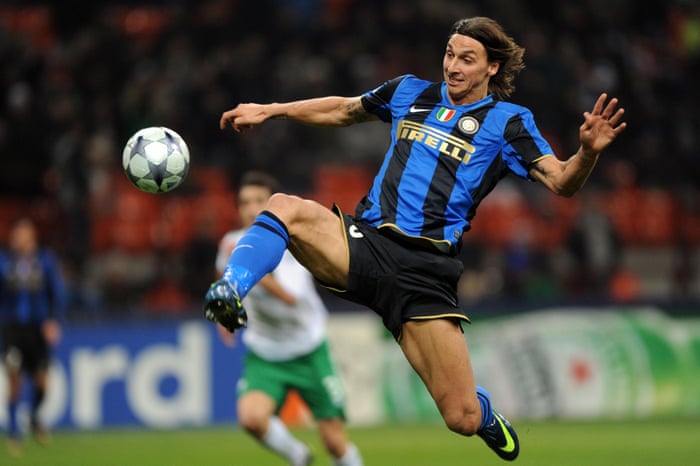
He was last there a month ago, so he took the kids. He was shooting a commercial, and it wasn’t long before a crowd gathered. “They were loud, aggressive. But yes, I wanted them [his sons] to see it. My roots.” Is humility important to him? “We are simple as a family.” What about the Scandinavian concept of Jantelagen (an ethos that, roughly, means everyone is the same). “No. I follow my own law,” he says, bursting out laughing. What is his level of fame like? “I try not to be stressed. We, my family, just follow our own rules. We are traditional, principled. You have to be like that outside of work. Otherwise you argue ...”
It’s clear he has become numb to the trappings of fame. He doesn’t care what people think, which means, beneath the real/pseudo hubris, Ibrahimovic is a mystery. He reportedly owned a gold Humvee, but he also likes lake fishing: he posted a photograph on Facebook of him holding his catch on a little boat emblazoned with a sticker of the punk band Black Flag (he has said he prefers reggae). He also says he doesn’t care what he looks like – but what about the long hair, which he won’t cut and which he likens to Samson’s? He’s a tease. But he’s also warm, witty, grounded and engaged; he’s keen to know if the Guardian hacked any phones and appears relieved to hear not.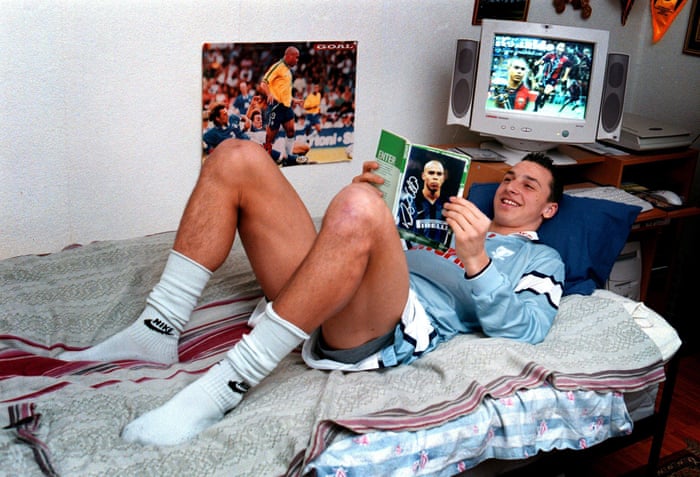 He’s about to leave Paris. “Paris is cool. They have everything. It’s
the coolest city. It’s all actors and singers, but everyone leaves me
alone.” What about Italy? “Italy is easy for a footballer. But Paris is
great,” he says evasively. Is the fashion good here? “Sure,” he says.
England is good for fashion, I say; he should think about coming. “For
vacation?” he replies, mock-rolling his eyes. “OK, what are your wishes
for me?” Liverpool, I suggest. “OK.” How about Leicester? “Pah,
Leicester had their time,” he sighs. “Will it happen again? It is not
easy.” I explain how a friend failed to put a £20 bet on the Midlands
club winning the Premier League at the start of the season. “How much
did she not get?” he asks. She would have won something like £100,000.
He lurches back with genuine distress, before muttering something about
the betting odds. How about Arsenal, I say. “Hmm, OK.” Manchester? I
tell him the fashion is good in Manchester and that in England he can be
anonymous. Or, at least, as anonymous as Zlatan could be. “Let’s see
what happens,” he says, flashing a grin.
He’s about to leave Paris. “Paris is cool. They have everything. It’s
the coolest city. It’s all actors and singers, but everyone leaves me
alone.” What about Italy? “Italy is easy for a footballer. But Paris is
great,” he says evasively. Is the fashion good here? “Sure,” he says.
England is good for fashion, I say; he should think about coming. “For
vacation?” he replies, mock-rolling his eyes. “OK, what are your wishes
for me?” Liverpool, I suggest. “OK.” How about Leicester? “Pah,
Leicester had their time,” he sighs. “Will it happen again? It is not
easy.” I explain how a friend failed to put a £20 bet on the Midlands
club winning the Premier League at the start of the season. “How much
did she not get?” he asks. She would have won something like £100,000.
He lurches back with genuine distress, before muttering something about
the betting odds. How about Arsenal, I say. “Hmm, OK.” Manchester? I
tell him the fashion is good in Manchester and that in England he can be
anonymous. Or, at least, as anonymous as Zlatan could be. “Let’s see
what happens,” he says, flashing a grin.

‘Hello. I am Zlatan,” announces Zlatan Ibrahimovic, Sweden’s greatest footballer – and author of the bestselling memoir I Am Zlatan. Then he sits down and finishes the wrap he is eating.
We’re upstairs in the Théâtre Trévise in Paris in early May. Ibrahimovic has called the city home since signing for Paris Saint-Germain from AC Milan in 2012. The next day, he will announce, in typically bombastic style, that he is leaving the club (“I came like a king, left like a legend”). Huge news, really – but today he’s here to talk about a new line of sportswear he has designed, light relief from the summer’s non-stop transfer chatter.
Ibrahimovic’s career has taken him to many of the world’s most famous football clubs – including Ajax, Juventus, Internazionale, Barcelona, AC Milan and PSG – at one point making him the sport’s most expensive player in total transfer fees (he has since been pipped to that accolade by former teammate Ángel Di María). Soon, if the reports are correct, he will add Manchester United to the list.
 Having spent so much time in two of Europe’s style capitals, perhaps
it’s unsurprising that he’s moving into fashion. His range, called A-Z,
is tasteful and – importantly – cheapish (about €39, or £31, for a top).
If you’re thinking monochrome tracksuits with “ZLATAN” printed down the
leg, think again. The collection comprises low-key, hyper-normal
sportswear – an edifying concept, given the way fashion has doggedly
co-opted sportswear in the past few years. The idea, he explains, is for
it to be affordable in a way that sportswear wasn’t when Ibrahimovic
was a second-generation immigrant teenager playing football in the 90s
in Rosengård, a tough, multi-ethnic district of Malmö. “The clothes are
basic,” he says with a smile. “They are for everyone of every
background. You know, like mine. I will never forget where I came from,
and I don’t forget the people I’ve met on
Having spent so much time in two of Europe’s style capitals, perhaps
it’s unsurprising that he’s moving into fashion. His range, called A-Z,
is tasteful and – importantly – cheapish (about €39, or £31, for a top).
If you’re thinking monochrome tracksuits with “ZLATAN” printed down the
leg, think again. The collection comprises low-key, hyper-normal
sportswear – an edifying concept, given the way fashion has doggedly
co-opted sportswear in the past few years. The idea, he explains, is for
it to be affordable in a way that sportswear wasn’t when Ibrahimovic
was a second-generation immigrant teenager playing football in the 90s
in Rosengård, a tough, multi-ethnic district of Malmö. “The clothes are
basic,” he says with a smile. “They are for everyone of every
background. You know, like mine. I will never forget where I came from,
and I don’t forget the people I’ve met on  Ibrahimovic grew up in Rosengård with his Bosnian Muslim father and
Croatian Catholic mother. “The first time I went into the city, I was
17. I didn’t know outside the area. I always wore hand-me-downs. It was
cool, though; for me, it [Rosengård] was paradise, because it was all I
knew.” As a teenager, he started playing for Malmö, before heading off –
in 2001, at the age of 19 – on his grand tour of Europe. “When you go
back [to Rosengård, now subsumed into a new district],” he says, “you
still see people in training clothes. There are no suits.”
Ibrahimovic grew up in Rosengård with his Bosnian Muslim father and
Croatian Catholic mother. “The first time I went into the city, I was
17. I didn’t know outside the area. I always wore hand-me-downs. It was
cool, though; for me, it [Rosengård] was paradise, because it was all I
knew.” As a teenager, he started playing for Malmö, before heading off –
in 2001, at the age of 19 – on his grand tour of Europe. “When you go
back [to Rosengård, now subsumed into a new district],” he says, “you
still see people in training clothes. There are no suits.”Now 34, Ibrahimovic’s rags-to-riches story makes this a fairly risk-free venture: first, people will buy the range because it’s by Zlatan; second, as he says: “Even if I stop playing now, I will have food to eat – and I will have food to eat for ever. I don’t do this for the economy.”
Still, footballers and fashion ... it’s a problematic marriage. Consider Cristiano Ronaldo and his catastrophic CR7 line. “When we talk about fashion, the only one is Beckham,” he says. “The rest? You leave them. These people, they see the doll in the window and they buy the exact clothes of the doll and walk out the shop and they think: I am fashion.” He leans forward. “I don’t follow fashion. If I like it, I buy it. I don’t think about what shirt goes with [what] pants. To me, you are football or you are fashion. Either you do it 100% or 200%. Not 10%. You don’t need to pretend to be perfect.”
This is typical Ibrahimovic. He describes his career in quotable hyperbole, phrases affectionately known as Zlatanisms – “a World Cup without me isn’t worth watching”, things like that. And with cause, you could say. The Guardian’s Barney Ronay described him as “a player capable of moments of skill and physical dexterity beyond the reach of pretty much anyone else on the planet”. He’s a genius and a maniac; random, acrobatic and spectacular. Nothing followed by nothing ... then the impossible: dribbling around six defenders to score (at Ajax) or the famous bicycle kick against England three years ago. When he plays, he’s a vision and a villain. In person, however, he’s open and smiling. When talking about “fashion”, he’s even a little nervous. “I am absolutely not perfect, I will still do mistakes.” I haven’t seen you make mistakes, I say. “Listen. Tiger Woods pretended to be perfect. And what happened? We learn from mistakes. I am realistic – and I have always said this.” He pauses. “But only I decide if it is a mistake.” He bursts out laughing. And he’s back.

The Zlatanisms are there (he talks about himself in the third person with complete sincerity), but it soon becomes clear they are for my benefit – he waits to be goaded and delivers them with deep, Swedish irony. He says the absurd (everything is 200% or above) and he periodically slips into motivational chat: “I want to take over. I want to take the challenge and be No 1. I don’t give up.” But every Zlatanism is postscripted with his familiar grin, sometimes a cackle. He giggles like a drunk fox. It’s infectious.
Does he agree that the most stylish people in football are often the ones not on the pitch? “Managers are more elegant,” he says. “That is right for a coach. He has responsibility, he has to be a leader.” And who have been his leaders? “I like [former PSG boss Carlo] Ancelotti. [José] Mourinho [his old boss at Inter, and possibly his new one at Manchester United] is cool. The older they get, the cooler they get. The grey hair. The serious expression. I have a good relationship with all of them.” All? “Except one.” Pep? “Exactly.” He has previously said that, when he was at Barcelona, the then-manager Pep Guardiola (soon of Manchester City) made him feel like an “alien”. Today, though, he seems more meditative on the subject. He shrugs at his name: “I don’t need negative energy.”
***
Next Monday, just before 5pm, Ibrahimovic will lead out his nation for their first game of Euro 2016, against Ireland, and his 114th cap. He hasn’t lived in the country permanently since his teens, but he still has a home in Sweden. “I do feel Swedish, even though I don’t live there now,” he says. “I still try to represent Sweden.” Is he a hero there? “I don’t know,” he shrugs. “I am good at what I do. I guess I am the new Sweden, the new generation, because of all these new backgrounds. I am proud of what we have done, and the immigrants who are stabilising in Sweden.” What is it like, being the face of Swedish multiculturalism? “I believe I opened many doors for people in the same situation, and I stand for it. It was not easy. I needed to break through many walls to get here.”

He was last there a month ago, so he took the kids. He was shooting a commercial, and it wasn’t long before a crowd gathered. “They were loud, aggressive. But yes, I wanted them [his sons] to see it. My roots.” Is humility important to him? “We are simple as a family.” What about the Scandinavian concept of Jantelagen (an ethos that, roughly, means everyone is the same). “No. I follow my own law,” he says, bursting out laughing. What is his level of fame like? “I try not to be stressed. We, my family, just follow our own rules. We are traditional, principled. You have to be like that outside of work. Otherwise you argue ...”
It’s clear he has become numb to the trappings of fame. He doesn’t care what people think, which means, beneath the real/pseudo hubris, Ibrahimovic is a mystery. He reportedly owned a gold Humvee, but he also likes lake fishing: he posted a photograph on Facebook of him holding his catch on a little boat emblazoned with a sticker of the punk band Black Flag (he has said he prefers reggae). He also says he doesn’t care what he looks like – but what about the long hair, which he won’t cut and which he likens to Samson’s? He’s a tease. But he’s also warm, witty, grounded and engaged; he’s keen to know if the Guardian hacked any phones and appears relieved to hear not.
 He’s about to leave Paris. “Paris is cool. They have everything. It’s
the coolest city. It’s all actors and singers, but everyone leaves me
alone.” What about Italy? “Italy is easy for a footballer. But Paris is
great,” he says evasively. Is the fashion good here? “Sure,” he says.
England is good for fashion, I say; he should think about coming. “For
vacation?” he replies, mock-rolling his eyes. “OK, what are your wishes
for me?” Liverpool, I suggest. “OK.” How about Leicester? “Pah,
Leicester had their time,” he sighs. “Will it happen again? It is not
easy.” I explain how a friend failed to put a £20 bet on the Midlands
club winning the Premier League at the start of the season. “How much
did she not get?” he asks. She would have won something like £100,000.
He lurches back with genuine distress, before muttering something about
the betting odds. How about Arsenal, I say. “Hmm, OK.” Manchester? I
tell him the fashion is good in Manchester and that in England he can be
anonymous. Or, at least, as anonymous as Zlatan could be. “Let’s see
what happens,” he says, flashing a grin.
He’s about to leave Paris. “Paris is cool. They have everything. It’s
the coolest city. It’s all actors and singers, but everyone leaves me
alone.” What about Italy? “Italy is easy for a footballer. But Paris is
great,” he says evasively. Is the fashion good here? “Sure,” he says.
England is good for fashion, I say; he should think about coming. “For
vacation?” he replies, mock-rolling his eyes. “OK, what are your wishes
for me?” Liverpool, I suggest. “OK.” How about Leicester? “Pah,
Leicester had their time,” he sighs. “Will it happen again? It is not
easy.” I explain how a friend failed to put a £20 bet on the Midlands
club winning the Premier League at the start of the season. “How much
did she not get?” he asks. She would have won something like £100,000.
He lurches back with genuine distress, before muttering something about
the betting odds. How about Arsenal, I say. “Hmm, OK.” Manchester? I
tell him the fashion is good in Manchester and that in England he can be
anonymous. Or, at least, as anonymous as Zlatan could be. “Let’s see
what happens,” he says, flashing a grin.


Comments
Post a Comment